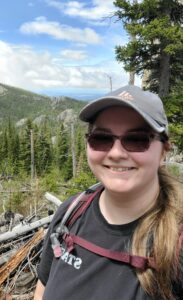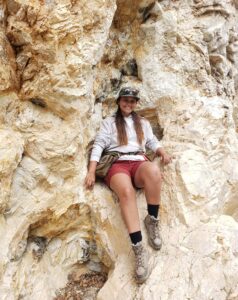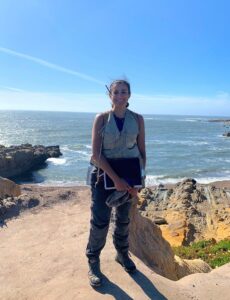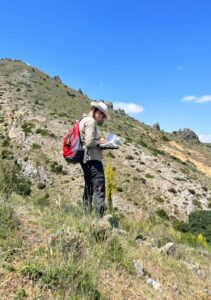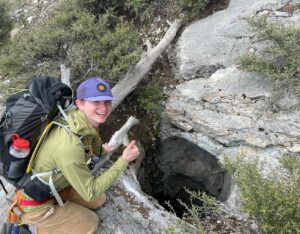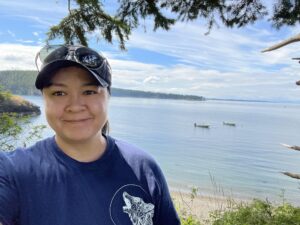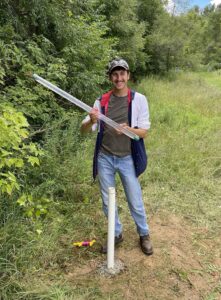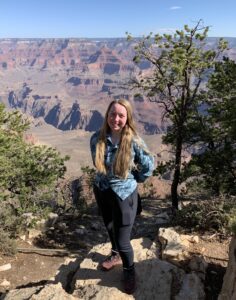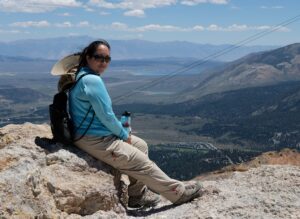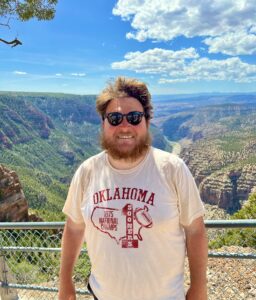 Where did you attend field camp?
Where did you attend field camp?
I attended the University of Oklahoma’s Bartell Field Camp located in Cañon City, Colorado. We also took a ten-day regional trip to Vernal, Utah, and the Leadville region in Colorado.
What did receiving the J. David Lowell Field Camp Scholarship mean to you?
I was honored to have received the J. David Lowell Scholarship and represent the GSA during my field camp this past summer. With the reception of the scholarship, the heavy burden of field camp tuition and fees was relieved, and I could focus solely on completing field camp and starting my professional geoscience career.
What did that experience teach you about the geosciences, yourself, and your future career?
Cold, brisk mountain air entered my lungs as I took a deep breath. I stood on my cabin’s porch looking out into the distance, witnessing the snow-covered peak of Pikes Peak and surrounding mountains. For three years, I often wondered whether I would actually get to field camp, especially during those heartbreaker courses such as igneous and metamorphic petrology or seismic exploration. But at that very moment, with the cold and silent air interrupted by Dr. Shannon Dulin driving the 4×4 by my cabin, I knew this was not a fever dream in the Youngblood Geological library, but I had really made it.
Field camp was not always so peaceful or fun as we slogged through rivers at 10,000 feet to study waterborne contaminants, or hiked miles struggling to understand and map the surrounding contacts. The challenge of field camp built resilience and confidence in ourselves while learning to work in teams. It taught us patience when our teams navigated conflicts and disagreements.
The immersion in field camp brought independence from the classroom that most of us sought after spending three years in lectures and labs with textbook after textbook. We were ready to test our skills and knowledge on real-world formations such as the Morrison and Dakota. The orange and engraved Brunton, generously provided by Brunton, came in handy as I took multiple strike and dips during our mapping in Grape Creek, and aided in confirming and disproving multiple hypotheses in the field. I became aware of the importance of clear notes, accurate sketches, and active thinking in the field to developing and then proving a theory. While I enjoyed being outdoors, hiking several miles a day, Bob and Carolyn’s cooking, and utilizing my geology education, it was being with my friends I cherished most.
The nights were often spent relaxing with friends on the porch discussing topics such as the NBA finals, plans for our off days, and goals for after graduation. Friendships and bonds were strengthened as we struggled and succeeded together through the five weeks at the Bartell Field Camp. Moments such as visiting the Royal Gorge, witnessing the fire-toned sunset on the main cabin’s deck, and being in the presence of friends whom I now call family are moments I will cherish for the rest of my life.
What opportunities did attending field camp provide that you wouldn’t have had otherwise?
As a geology student during the COVID-19 pandemic, many of the valuable field trips were canceled or restricted to one outing for the semester. Valuable lessons often experienced in the field were lost to Zoom meetings, PowerPoints, and sometimes poor-quality YouTube videos. Field camp provided the opportunity to relearn these lessons and practice geoscience in the field instead of a virtual environment. While classwork and books can teach fundamentals such as rock identification or sedimentary structures, they do not convey the same experience when conducted in the field. Field camp provided exposure to geological features and challenges that required the combination of our strenuous prerequisites, books, and observations to solve them. There is simply no better substitution than active learning and application of geological skills in field camp.
In your opinion, how important is field camp for geoscience students?
Field camp is critical for geoscience students in order to gather experience with real-world geological problems and features, while developing and expanding their skillset to better transition into their professional careers or graduate school. This is achieved through the immersion into field camp for several weeks where their skills, education, and confidence cannot only be tested, but also developed and grown with observation and leadership from the surrounding faculty.
Recent debates have argued whether the future geoscientist will still need field camp due to the increased use and reliance on technology in the geoscience field. However, future geoscientists will still need an in-person field camp. Geological problems and solutions are physical in nature; therefore, technology will never be a suitable sole solution. It is and will always be necessary to be “hands and nose on” with outcrops and other geological features to develop, confirm, or deny hypotheses. We can still use machine learning algorithms for better fault picking in seismic datasets and UAVs for mapping, but all geoscientists need an underlying respect for nature that technology cannot provide versus being surrounded by the sheer power the Earth holds. Being physically present at geological sites serves as a reminder to geologists of the power and history of our subject matter.
Why should individuals support field camp opportunities for students?
Attending field camp is not only required for most geoscience degrees, but it is also critical for the expansion of skills required for professional development in the geoscience industry. Further, field camp is often conducted during the summer over a period of weeks and does not allow for students to have internships or employment to aid in the costs of field camp. Without the generous support from the GSA and the J. David Lowell Field Camp Scholarship, many geoscience students would not be able to afford to attend their field camps.

